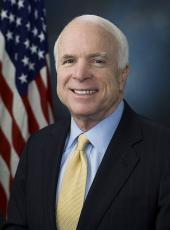Good morning, this is John McCain, speaking to you at the end of an eventful week in the presidential campaign. All the talk today is about my opponent's selection of his running mate. To his new running mate, my congratulations and I'll get back to you real soon on your debating opponent.
The week began with a debate of sorts between Senator Obama and me at Saddleback Church in Lake Forest, California. In case you missed it, the discussion yielded the line of the week, and maybe even of the campaign, when Pastor Rick Warren asked my opponent a very serious question. He wanted to know at what point, in my opponent's view, does a baby have human rights? Senator Obama thought about it for a moment, and came back with the reply that the question was, quote, "above my pay grade."
Here was a candidate for the presidency of the United States, asked for his position on one of the central moral and legal questions of our time, and this was the best he could offer: It's above his pay grade. He went on to assure his interviewer that there is a, quote, "moral and ethical element to this issue." Americans expect more of their leaders.
There seems to be a pattern here in my opponent's approach to many hard issues. Whether it's the surge in Iraq that has brought us near to victory, or the issue of campaign reform, or the question of offshore drilling, Senator Obama's speeches can be impressive. But when it's time for straight answers, clear conviction, and decisive action, suddenly all of these responsibilities are -- well, as he puts it, "above my pay grade." As mottos of leadership go, it doesn't exactly have the ring of "the buck stops here."
Often, too, Senator Obama's carefully hedged answers obscure more than they explain, and this was the case in his conversation with Rick Warren. Listening to my opponent at Saddleback, you would never know that this is a politician who long since left behind any middle ground on the abortion issue. He is against parental notification laws, and against restrictions on taxpayer funding for abortions. In the Illinois Senate, a bipartisan majority passed legislation to prevent the horrific practice of partial-birth abortion. Senator Obama opposed that bill, voting against it in committee and voting "present" on the Senate floor.
In 2002, Congress unanimously passed a federal law to require medical care for babies who survive abortions -- living, breathing babies whom Senator Obama described as, quote, "previable." This merciful law was called the Born Alive Infants Protection Act. Illinois had a version of the same law, and Barack Obama voted against it.
At Saddleback, he assured a reporter that he'd have voted "yes" on that bill if it had contained language similar to the federal version of the Born Alive Infants Protection Act. Even though the language of both the state and federal bills was identical, Senator Obama said people were, quote, "lying" about his record. When that record was later produced, he dropped the subject but didn't withdraw the slander. And now even Senator Obama's campaign has conceded that his claims and accusations were false.
For a man who talks so often about "hope," Senator Obama doesn't offer much of it in meeting this great challenge to the conscience of America. His extreme advocacy in favor of partial birth abortion and his refusal to provide medical care for babies surviving abortion should be of grave concern to reasonable people of goodwill on both sides of this issue. There is a growing consensus in America that we need to overcome narrow partisanship on this issue for both women in need and the unborn. We need more of the compassion and moral idealism that my opponent's own party, at its best, once stood for. No one is above the law, and no one is beneath its protection.
Upholding these principles, and bringing Americans together on the side of life, is the work of leadership. And I can assure you that if I am president, advancing the cause of life will not be above my pay grade. Thanks for listening.
John McCain, Senator McCain's Weekly Radio Address Online by Gerhard Peters and John T. Woolley, The American Presidency Project https://www.presidency.ucsb.edu/node/278749

